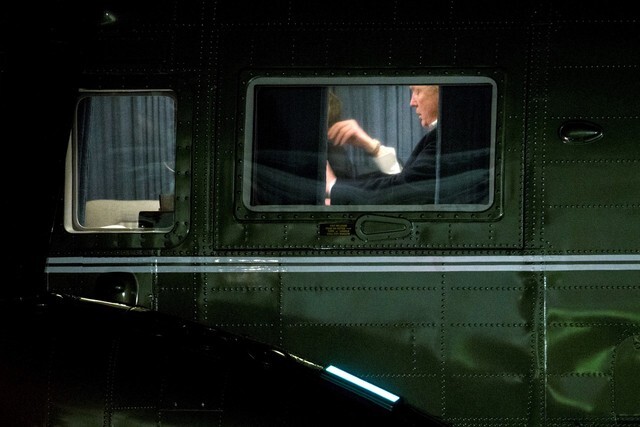hankyoreh
Links to other country sites 다른 나라 사이트 링크
American experts worry that the country is becoming isolated from Asia

US foreign affairs experts are voicing concerns about the country’s deepening economic isolation in Asia. The fears have been prompted by US President Donald Trump’s reiteration of plans to pull out the Trans-Pacific Partnership (TPP) during his recent Asia tour, and Japan’s conclusion of a Comprehensive and Progressive Agreement for the Trans-Pacific Partnership (CPTPP) with 11 member countries – not including the US.
“[W]hen the history of Trump's trip is written, it will be his decision to opt out of an Asian trade framework, the Trans-Pacific Partnership, that has the gravest and most lasting consequences,” Council on Foreign Relations president Richard Haass wrote in a Nov. 14 contribution to the website Axios.
“His approach marginalizes the United States in a region that will define the 21st century,” Haass concluded.
“American businesses will find themselves unable to compete in Asian markets,” he predicted, adding that Trump’s policies would “exact a strategic price as well, leaving U.S. allies on their own to contend with China's massive economic weight.”
“No laundry list of one-off deals and bilateral accords will compensate for the losses [from the TPP withdrawal],” he warned.
In a Nov. 12 interview with the Hankyoreh, Frank Jannuzi, president of the Washington think tank the Mansfield Foundation, predicted that if the US backed out of the TPP, Japan was likely to react by establishing a solid partnership arrangement with 11 members and distribute the future risk with regard to China. While visiting Japan as the first stop in his Asian tour on Nov. 6, Trump made it clear that he has no plans for the US to re-enter the TPP framework.
“We will have much bigger trade with the way we are doing it right now, and it will be a much less complex situation,” he said at the time.
As a strategic issue, the TPP has the potential to determine Japan’s future. In economic terms, Japan was overtaken by China in GDP as of 2010. OECD projections for purchasing power parity (PPP) GDP levels in 2030 put China first in the world at US$26.3072 trillion and Japan at US$4.8786 trillion –around one-sixth China’s scale. Non-government reports suggested the difference between the two countries could be nearly tenfold by 2050.
As the economic gap grows, Japan’s military and diplomatic leverage over China markedly diminishes. This also accounts for its attempts to increase the Japanese market presence in southeast Asian countries like Vietnam, Malaysia, and Singapore through tariff reductions and trade regulations within the TPP framework.
The TPP was also extremely important in political and diplomatic terms as a way for Japan to join the US in assuming a guiding role in the Asia-Pacific order and curbing China. The US’s decision to back out could be read as signaling that it is leaving it up to Japan to contain China within the Asian region. Japanese Prime Minister Shinzo Abe’s remarks on Nov. 14, when he described the agreement on a broader TPP framework without the US as “great progress” and pledged to “continue leading discussions so that it takes effect quickly,” could be interpreted as a “declaration of independence” to Washington strategists.
Chinese experts have also reportedly been discussing the scenario of China joining the TPP at the working group level. China has already established the Asian Infrastructure Investment Bank (AIIB) and is currently in talks to conclude the Regional Comprehensive Economic Partnership (RCEP) next year. While it is still too early to tell whether this will lead to any policy measures from Beijing, its acceptance by the TPP could go down for the US as the diplomatic failure that cost the country its influence in Asia.
By Yi Yong-in, Washington correspondent and Cho Ki-weon, Tokyo correspondent
Please direct questions or comments to [english@hani.co.kr]

Editorial・opinion
![[Column] Life on our Trisolaris [Column] Life on our Trisolaris](https://flexible.img.hani.co.kr/flexible/normal/500/300/imgdb/original/2024/0505/4817148682278544.jpg) [Column] Life on our Trisolaris
[Column] Life on our Trisolaris![[Editorial] Penalties for airing allegations against Korea’s first lady endanger free press [Editorial] Penalties for airing allegations against Korea’s first lady endanger free press](https://flexible.img.hani.co.kr/flexible/normal/500/300/imgdb/original/2024/0502/1817146398095106.jpg) [Editorial] Penalties for airing allegations against Korea’s first lady endanger free press
[Editorial] Penalties for airing allegations against Korea’s first lady endanger free press- [Editorial] Yoon must halt procurement of SM-3 interceptor missiles
- [Guest essay] Maybe Korea’s rapid population decline is an opportunity, not a crisis
- [Column] Can Yoon steer diplomacy with Russia, China back on track?
- [Column] Season 2 of special prosecutor probe may be coming to Korea soon
- [Column] Park Geun-hye déjà vu in Yoon Suk-yeol
- [Editorial] New weight of N. Korea’s nuclear threats makes dialogue all the more urgent
- [Guest essay] The real reason Korea’s new right wants to dub Rhee a founding father
- [Column] ‘Choson’: Is it time we start referring to N. Korea in its own terms?
Most viewed articles
- 160% of young Koreans see no need to have kids after marriage
- 2New sex-ed guidelines forbid teaching about homosexuality
- 3[Column] Life on our Trisolaris
- 4S. Korea discusses participation in defense development with AUKUS alliance
- 5Hybe-Ador dispute shines light on pervasive issues behind K-pop’s tidy facade
- 6Months and months of overdue wages are pushing migrant workers in Korea into debt
- 7[Reporter’s notebook] In Min’s world, she’s the artist — and NewJeans is her art
- 8Presidential office warns of veto in response to opposition passing special counsel probe act
- 9Japan says it’s not pressuring Naver to sell Line, but Korean insiders say otherwise
- 10[Editorial] Penalties for airing allegations against Korea’s first lady endanger free press